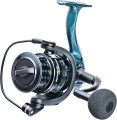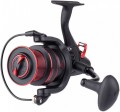Number of bearings
The number of bearings provided in the design of the reel. Bearings are used to reduce friction of rotating parts, which, on the one hand, protects such parts from wear, and on the other hand, reduces excessive effort expended when the handle is rotated. Accordingly, the
more bearings, the more friction units are protected and the better the coil is “optimized”; this parameter is a good indicator of the overall class of the product. At the same time, it is necessary to evaluate different models taking into account their purpose (see "Type").
So, in fly fishing reels, even quite expensive ones, 1 bearing is usually provided — at the point of installation of the drum on a bracket designed for attachment to the rod. This is actually the only significant friction point, so more bearings are simply not required. For multiplier reels, this number varies from 1 for relatively simple options to 6 – 7 for premium ones. And in inertia-free bearings, the number of bearings can reach a couple of dozen.
Gear ratio
The gear ratio describes the difference in the speed of rotation of the spool and the handle. In reel specifications, it is often written as a ratio of the form x:1, where one indicates 1 turn of the handle, and “x” is the number of turns of the spool in one such turn. To simplify the record, only the first number is indicated in our catalog — for example, the designation 5.2 corresponds to a gear ratio of 5.2: 1.
First of all, the ratio between the speed and the "torque" of the coil depends on this parameter. So, high gear ratios allow you to quickly pull the line, which is important for high-speed wiring — but the power of such reels will be low, and significant efforts on the handle will be required to pull large prey. Conversely, at low numbers, the speed of the line will be small, but you will not have to make significant efforts to move it. In models of the inertialess type (see above), gear ratios of the order of 6 – 7 denote the so-called "high-speed" coils, 4 – 4.5 – "power", and intermediate values \u200b\u200bare universal. Due to their specificity, multiplier models usually have low gear ratios, and the high power of fly fishing reels is due to the fact that the angler rotates the drum directly in them, and the gear ratio is 1.
Baitrunner
The presence of a baitrunner in the design of the coil. A baitrunner is a special device for bleed fishing line, used when catching large strong fish, primarily carp. The bite of such prey, even with relatively small sizes, can be so powerful and sharp that with the main clutch clamped, the fish can break the line or even break the rod. At the same time, without the brake being pressed, it is impossible to perform effective hooking.
Bayrunner resolves this contradiction. When turned on, it allows the line to come off the reel with some effort, ignoring the main drag — this reduces the risk of breaks and other troubles during strong jerks, while maintaining control over the tackle. And when the baitrunner is turned off, the reel starts to work as usual, which ensures the convenience of playing. Switching between these modes is carried out with one movement of a special lever located on the back of the reel — this is much faster and more convenient than reconfiguring the clutch.
Coils with this feature are subject to special requirements for strength and reliability, so their cost is usually quite high.
Spool size
The size of the main spool (drum) of the reel. This parameter directly affects the weight of the coil and its resistance to stress. It uses a symbol in thousands; in order not to go into unnecessary details, we can say that the larger the number in such a designation, the larger and heavier the drum. For different purposes, different sizes will be optimal. So, spools for 2500 – 3000 are considered universal, they can be used for both float fishing and spinning fishing in simple conditions. The smaller size is recommended for light tackle, including ultralight category, and equipment for large and heavy prey (for example, when fishing for carp) may include reels for 4500 – 5000 and
even more.
Spool capacity
The amount of line that can fit on the main spool of a reel with normal winding. It is indicated as a ratio of two numbers, the first of which corresponds to the length of the reeled line in metres, and the second to the thickness in millimetres: for example, the numbers 200 / 0.45 indicate that up to 200 m of fishing line with a thickness of 0.45 mm can fit on the reel.
For different types of fishing, there are recommendations on the optimal value of this parameter; they can be found in special sources. Here we note that the capacity of the spool is indicated exclusively for a smooth fishing line; when using a braided cord, the actual performance may differ markedly.
Weight
The total weight of the reel (only the device itself, without fishing line). This parameter is important, first of all, for those who select equipment of
the ultralight class — in such gear, the struggle is, as they say, for every extra gram. In other cases, you can not pay special attention to weight.



